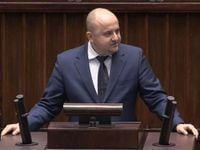Dariusz Matecki, a member of the ruling Law and Justice party (PiS), is currently facing serious legal troubles as he remains in custody following his arrest on March 7, 2025. Charged with embezzlement, corruption, and misuse of funds related to the Justice Fund, Matecki has been vocal about his claims of innocence, even labeling himself a "political prisoner" during the recent Easter holiday, which he spent behind bars.
Matecki's arrest has been a significant event in Polish politics, drawing attention not only to his personal situation but also to the broader implications of political power and accountability in the country. The prosecutor's office has leveled six charges against him, each carrying a potential sentence of up to ten years in prison. Despite the gravity of the allegations, Matecki has steadfastly maintained his innocence, asserting that he has fallen victim to a political witch hunt orchestrated by the government led by Donald Tusk and Adam Bodnar.
In a series of posts on his social media account on X, formerly known as Twitter, Matecki sought to communicate with his supporters and the public from his confinement. On Easter Sunday, April 20, 2025, he shared a video message in which he expressed his belief that he is unjustly imprisoned, stating, "This year's Easter I have to spend in a place that should never become a symbol of political repression." He emphasized that the injustices he faces are indicative of Poland's drift away from freedom and the rule of law under the current administration.
His Easter messages were not limited to personal reflections. In another post, he included an image of Jesus Christ and reiterated his claims of being a victim of a hostile regime. He remarked, "The injustice I am experiencing is proof of how far Poland under the rule of Donald Tusk and Adam Bodnar is moving away from freedom and the rule of law." Such statements have sparked debates about the intersection of politics and religion, particularly during a time when many Poles observe significant religious holidays.
Matecki's situation has raised concerns among experts regarding the psychological toll of incarceration, especially during holidays. Dr. Paweł Moczydłowski, an expert in prison affairs and former head of the Prison Service, highlighted that the holiday season can be particularly challenging for inmates, who often face deep feelings of isolation and separation from their families. He explained that the routine in prisons does not change dramatically during holidays, and inmates do not receive special privileges or festive meals unless specifically arranged by the facility's administration.
Dr. Moczydłowski pointed out that decisions about any holiday accommodations for inmates, such as special meals or visits from clergy, require approval from the prison director. He noted, "Everything brought into the prison must be thoroughly searched, and there are strict regulations that do not change for holidays." This strict adherence to protocol means that inmates like Matecki cannot expect any leniency during significant times of the year.
In a poignant reflection of the challenges faced by inmates during the Easter season, Dr. Moczydłowski explained, "They do not have their families and loved ones around. They confront loneliness and isolation, which makes the separation more acute." The expert's insights shed light on the emotional landscape of inmates, including Matecki, who must navigate their circumstances without the support of their loved ones.
Despite the restrictions, Matecki's supporters have attempted to reach out to him. Reporters from the media outlet wPolsce24 attempted to deliver a basket of Easter food to him in prison, highlighting the public's interest in his case. However, due to regulations that prohibit the transfer of food packages from outside, the effort was unsuccessful. The prison's adherence to these rules underscores the challenges faced by families and supporters of incarcerated individuals who wish to provide comfort during difficult times.
As Matecki continues to navigate his legal battles, his situation serves as a focal point for discussions about political accountability in Poland. The allegations against him, coupled with his claims of political persecution, have sparked a wider conversation about the nature of justice and the influence of political power in the country. Observers are keenly watching how this case unfolds and what it may mean for the future of the Law and Justice party and its leadership.
In the coming weeks, Matecki's legal team is expected to mount a defense against the charges, and the political landscape in Poland may shift as more details emerge. As Matecki remains in custody, the implications of his case will likely resonate beyond his personal circumstances, raising questions about governance, accountability, and the rule of law in Poland.
With the Easter season now passed, the focus will shift back to the legal proceedings against Matecki and the ongoing political dynamics that surround his case. As he continues to assert his innocence and rally support, the situation remains fluid, and the potential ramifications for Polish politics are significant.







